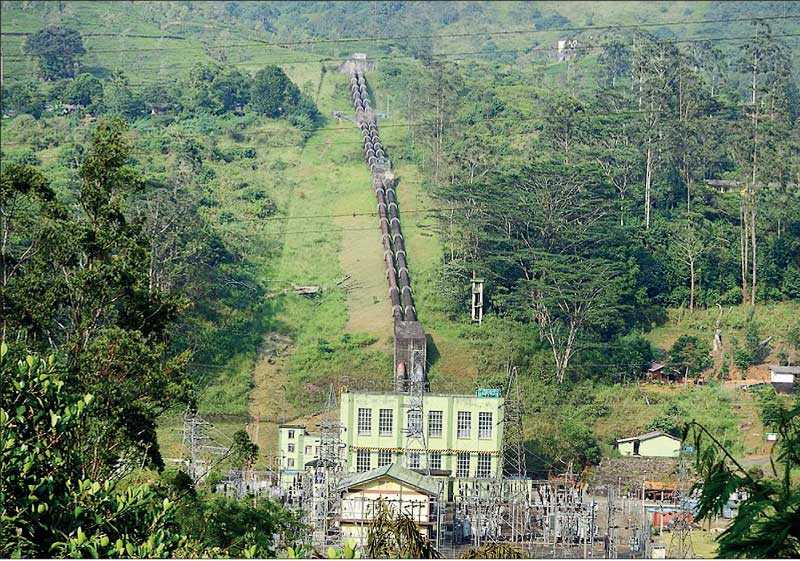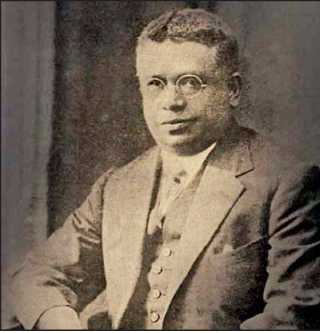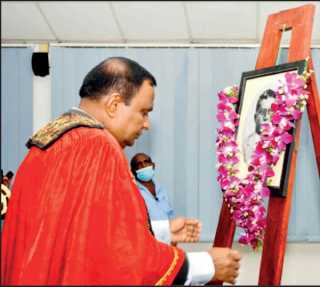Monday Feb 23, 2026
Monday Feb 23, 2026
Thursday, 22 October 2020 01:17 - - {{hitsCtrl.values.hits}}

The Wimalasurendra Power Station
 |
| Eng. D.J. Wimalasurendra
|
 |
| At the 2020 146th Birth Anniversary D.J. Wimalasurendra Memorial Oration
|
Look around, dig some dirt and take a deep breath, and ask how nations are made, including even destroyed. You will find you can identify names of individuals who have had the ability to rally people around, move mountains of obstacles but persisted on their objective. Even in bringing down a country the recipe stays the same. Persistence delivers, rewards and pays.
The ability of an individual to stick to his or her ideas is an amazing characteristic definitely of value. The fickle nature of minds and actions so common today definitely too have the ability to ruin nations as the constituents are a law unto themselves or are all confused Alices in their wonderlands. A student with a worthy selfless purpose is a treat to teach.
John F. Kennedy said famously, “Do not ask what the country can do for you but ask what you can do to the country!” We have had JFK with a purpose but unfortunately we had Lee Harvey Oswald with a sinister purpose too. In making a nation the sacrifices could be many and the time taken significant. As per destruction some of those challenges are not there.
Lighting up Sri Lanka
Engineer D.J. Wimalasurendra was an individual who pioneered the way to light up Sri Lanka through his imagination and knowledge. The nation celebrated his birth anniversary on 17 September, which is an annual activity of the Institution of Engineers Sri Lanka.
The 2020 146th Birth Anniversary D.J. Wimalasurendra Memorial Oration was delivered by Eng. Rohan Senevirathne, the ADG of the Ceylon Electricity Board. Rohan tracked the journey from the initial Blackpool power station to 100% electrification and beyond in his ‘Reimagining Ceylon Electricity Board for Future’. The event is always an opportunity enabling our young to be reminded of an individual who served Sri Lanka with imagination and always it is hoped that some young one would look up to him as a role model. Eng. D.J. Wimalasurendra is an illustrious son of Sri Lanka and can rightly be called the ‘Father of Hydroelectricity’. He was the first to conceive the idea of harnessing the flowing waters of the country’s rivers for the generation of electricity and thereby having hydroelectricity. Electricity would be cheaper and foreign exchange would be saved.
 It is interesting to think that he was concerned then about the cost of electricity generated as fossil fuels had been specifically imported for the purpose. The concern coupled with exploration sparked the idea. He understood well the importance of electricity in enabling uplifting the standards of living of the people. The quest thus was for an alternative mechanism and thanks to him renewable electricity appeared in the country, which was to play a lead role till recently. Rohan in his memorial lecture eluded to the goal of this young engineer – to generate electricity and support an industry base.
It is interesting to think that he was concerned then about the cost of electricity generated as fossil fuels had been specifically imported for the purpose. The concern coupled with exploration sparked the idea. He understood well the importance of electricity in enabling uplifting the standards of living of the people. The quest thus was for an alternative mechanism and thanks to him renewable electricity appeared in the country, which was to play a lead role till recently. Rohan in his memorial lecture eluded to the goal of this young engineer – to generate electricity and support an industry base.
Persistence is key
His life is an example of persistence over a goal. Many lessons are available to us from his life story, especially in these COVID times where Sri Lanka has to be innovative in ways of management as old rules and procedures are no longer valid.
His initial proposal on hydropower was ignored by the Engineering Association of Ceylon. The rejection did not deter him at all as he went on to construct the first small hydropower station in Ceylon at Blackpool between Nanuoya and Nuwara Eliya. The result – cheap electricity came to Nuwara Eliya.
With that demonstration and success behind him, he once again submitted a paper to the Engineering Association of Ceylon titled ‘Economics of Hydropower Utilisation in Ceylon’ in 1918. He envisioned lighting 100,000 lamps. He further introduced the concept of developing a national grid.
Though the colonial government undertook the development of hydropower, he found himself ignored and left out. Though many an obstacle got in his way, he used his own funds for research and still pushed hard for hydropower. Incidentally he also built the first thermal power station in 1929 – the Stanley Power House.
The British were interested in finding gold and the man chosen for the task was Wimalasurendra. Perhaps the logic was that in 1901 he had spent time on a survey on mineral deposits in the Kelani Valley. The British sent him to Aberdeen Laxapana fall area as the initial place for exploration. Instead of finding gold he saw the possibility of hydropower generation once again.
The rejections and undermining of his work was aplenty but he never succumbed to negativity and used his own funds in writing the detailed plan as a paper in 1918. In 1924 the Laxapana hydropower scheme did start but weak government support meant the work almost immediately stopped.
His determination to see hydropower through was not to be thwarted. He took early retirement from public service and contested to enter the State Council of Ceylon. The reason to enter politics was to ensure the restart of Laxapana and to move the process ahead. He managed just that but it was only in 1950 that the Laxapana scheme was finally completed and opened.
I believe Eng. D.J. Wimalasurendra had the personal satisfaction of going through the tunnel and seeing his idea becoming a reality. Thereafter hydropower was central to power sector developments in Sri Lanka till recently. His contribution was duly recognised with naming the power station ‘Wimalasurendra Power Station’.
As we remember him today, I see that we owe so much to him for that persistence and delivery. Powering up a nation is no easy task and that what he did bringing power system resilience through water flow to electricity – a modern addition to the ancient glory days of water conservation to food sufficiency.
Wimalasurendra’s broader vision
In the Wimalasurendra Memorial Lecture of 2020 Rohan Senevirathne eludes briefly to Wimalasurendra’ broader vision – his intent that cheap electricity could bring about an industry age to Sri Lanka.
This reminds of a statement D.J. Wimalasurendra made in State Council of Ceylon (Hansard of 8 October 1931): “Besides, the experiments referred to by our learned fried, were not carried out by Ceylonese; they were carried out by European gentlemen who were perhaps not very keen to have the industry introduced into this country. Such an introduction would have meant that about 5,000 to 20,000 people in Europe would be thrown out of employment… I went over what is known as the ‘Sunken Country’ in England, where they manufacture, refine and export salt. We get our table salt from abroad, in spite of the fact that we have salt all round our coast! What we are really doing here is to retard the manufacture of salt in spite of having a highly paid salt adviser and a big staff. When we have cheap electricity, by the process of electrolysis, we will be able to manufacture soda, potash, bleaching powder, and so on, and other alkali necessary for the manufacture of soap and other chemical products.”
This is a quite strong statement on the need of industry with cheap electricity. Today in 2020 it is really sad there were no individuals to ensure this aspect of vista of Wimalasurendra. We do not have any of these basic chemicals manufactured today and even salt is still coming from outside, though now a very small quantity.
It is not actually electricity that would enable a higher quality of life but the presence of an industry sector that is powered competitively. In these COVID times, for basic sanitisation we depend on the chemical chlorine to come from outside but Wimalasurendra then, nearly 90 years early, said to produce soda and bleaching powder from electrolysis of sea water.
It was Pythagoras who said that salt is born of the purest of parents – the sun and the sea. Having both in plenty, if we still pursue import of salt, there is no excuse. I am sure here D.J. Wimalasurendra would be quite disappointed to witness this aspect of Sri Lanka today if he was pressed to pass a comment.
Eng. D.J. Wimalasurendra directly articulated and contributed to the realisation of the vision of hydropower. His vision to have an industry sector is still awaited. This perhaps calls for another Sri Lankan to move with a vision and persistence.